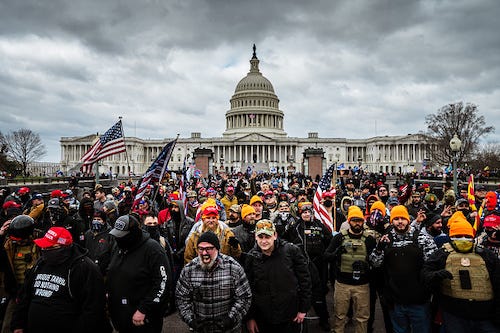Special Update
January 11, 2021
Aggressive actions spark big questions for "Big Tech"
What's new: Over the last several days, multiple Internet companies have taken aggressive actions against the President, against online followers of conservative influencers, and against the Parler social media platform that is popular among conservatives.
Why this matters: There is growing fear among conservatives that actions taken in the wake of Wednesday's attack on the US Capitol will soon be expanded to broader restrictions of conservative online content and speech.
Key points:
1. Twitter's permanent ban of Donald Trump's personal account:
The President's Twitter account was initially suspended for 12 hours following the events at the Capitol on Wednesday.
When his account was reinstated, he posted the following two tweets:
"The 75,000,000 great American Patriots who voted for me, AMERICA FIRST, and MAKE AMERICA GREAT AGAIN, will have a GIANT VOICE long into the future. They will not be disrespected or treated unfairly in any way, shape or form!!!"
"To all of those who have asked, I will not be going to the Inauguration on January 20th."
Twitter initially determined these tweets did not violate their community standards and so they were left up.
However, the company also decided to monitor the conversation around these tweets and to follow that discussion across other platforms -- including on the Parler social media platform.
Twitter observed a growing number of users were citing or interpreting the President's tweets as calling for and/or justifying more violent political action and that specific, deliberate planning (including dates and locations) was being discussed and organized on Twitter and elsewhere. This is obliquely referenced in the first paragraph of Twitter's explanation of the ban.
This led Twitter to immediately close the President's account, to begin working with federal law enforcement, and to leverage existing counterterrorism partnerships with other tech companies to share threat information.
Click here to read a statement from Heritage President Kay Coles James regarding Twitter's actions.
2. The near-simultaneous and sudden loss of thousands of "conservative" followers on Twitter and other platforms:
As the investigations expanded, Twitter and multiple other internet companies discovered various users and networks associated with QAnon were central to the observed threat activity.
It was decided to increase scrutiny on these accounts in an effort to mitigate the planning and sharing of violent actions and content.
These mitigation efforts consisted of placing suspect accounts in a type of "purgatory," where the accounts were locked, and they no longer appeared as "followers" until a user verified their identity (often by providing a phone number).
If the account is verified, the user's account is unlocked, and they show up again as "followers". If it cannot be verified, it remains blocked.
It appears many of the removed followers were bots and/or spammers (many associated with QAnon) and will not be coming back.
3. The banning of Parler by Amazon, Apple, and Google:
As the various platforms became aware of this growing threat stream, those with existing content moderation rules took action to remove violating accounts.
Parler, which appears to be a center of gravity for much of this activity, was not acting on content that was justifying, advocating, or planning violence and does not have a formal mechanism for users to report this content.
Just one example of violent content on Parler included the following statement by a vocal pro-Trump lawyer concerning the insurrectionists at the Capitol: "Let them in. Get the firing squads ready. Pence goes FIRST." (This specific post was taken down Saturday, but many others remain on the website.)
Parler's lack of moderation of violent content violates the requirements for being listed on Apple's and Google's app stores as well as the customer contract for Amazon's web hosting services -- and all three companies subsequently dropped Parler.
Amazon, Apple, and Google have legitimate concerns that they could be held liable for enabling or facilitating political violence, if Parler remained on their networks but continued to leave violent content unaddressed.
What I'm thinking: I'm still working my way through this and, no matter what, it's clear that the complexity of this challenge means that any policy course of action will have considerable tradeoffs. But two things are also true: first, the fact pattern above is rational and compelling (at least to me). And second, these companies' inability to win and to hold the public trust is a critical deficiency at moment of national crisis and this status quo is unsustainable.



Would be more credible should Twitter et al censor all others inciting violence. There is the bothersome issue of free speech and the use of expressions that can be accused of being violent but are not.